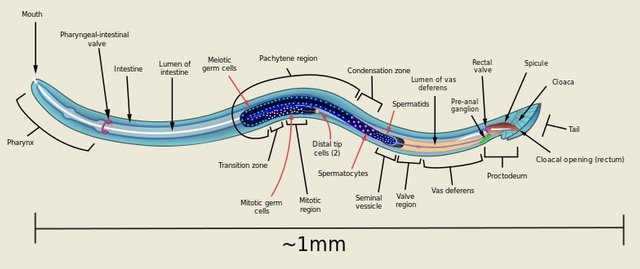C. elegans worms have the ability to regulate their age, humans could soon
With the various advances in science and technology which we have witnessed in the last couple of decades, do you know that there is only one creature whose brain has been mapped out completely? And it isn’t exactly what you would think.
Well, “C.elegans” is that creature and it is a “worm”. Yup, you read that right, “a worm”. So, go figure!

The C. elegans worm is quite a unique creature and its study has proven useful in the research of biological processes that could affect man, as well. So far, the worm and its brain activity and functionality has been studied for longevity – meaning that aging can be studied from the worm and perhaps manipulated for humans, towards longevity.
The Brain and Gut of the Worm
Scientists at the University of Michigan, including Shawn Xu, who is the lead author of the study, have discovered how the brain of the worm (C elegans) and its gut, communicate with each other throughout the body to coordinate aging.

How can such a tiny creature manipulate its own aging process?
Through the study and knowledge of the C. elegans nervous system and brain function, the scientists were able to discover a phenomenon referred to as the “axis of aging.” The axis of aging depicts the role of two types of neurons in the brain of the worm responsible for its body temperature changes. Also, the “axis of aging” system sends information to the gut, in order for the gut protein to act in different ways. The response and reactions influences the longevity of the worm.

Of the two neurons responsible for the ‘brain-gut’ system, one of the neurons is sensitive to cold. When there is a drop in temperature, the neuron releases serotonin into the worm’s gut in response. This activity and signal boosts the function of “protein DAF-16”; which is attributed to increased longevity and regulating aging.
The second neuron in the system functions in reverse, when it senses a rise in temperature. This it does by releasing an insulin-like substance into the gut capable of blocking the DAF-16 protein and reducing the longevity of the worm.
The research scientists discovered that the signals from the reactions are transmitted from the intestines of the gut to other parts of the worm’s body.
How can the study be applied to humans?
The study by the researchers revealed that it is the first time that the different organs has been shown to regulate an organism’s lifespan. According to the research; since the various pieces for the system and procedure are obtainable in other animals, the discovery can be carried across higher organisms and applied to humans.
Shawn Xu, one of the authors of the study says;
"From our findings, it's clear that the brain and gut can work together to detect aging-related information and then disseminate that information to other parts of the body. We think it's likely that this sort of signaling axis can coordinate aging not only in C. elegans, but in many other organisms as well."
Between "Fighting Aging" and "Aging Healthy"
Previous studies and hypothesis regarding immortality and fighting aging, led to the identification of certain genes which promote aging later in life, by scientists from the Johannes Gutenberg University. The research by the scientists further revealed that switching off or interrupting the function of those genes extended the lifespan of worms (C. elegans).
For humans, getting old and dying is part of nature's plan. But what if we could live, not just longer, but healthier as well. Because ideally, there's no point living to become 120 years old, if one would be practically bedridden for the last 20 years of his or her life.
Despite the fact that we would all eventually die, there isn't any crime in trying to increase our lifespan significantly if we can. Hence, several research and studies into the fight against aging at even the genetic level have been supported and initiated in the last few decades; as scientists continuously try to find means to slow down aging or even stop it.
Conclusion
Whether you would want to be an immortal or perhaps just break the record of Jeanne Calment, as the oldest recorded person that lived in our time, science could very soon have the solution and answer to your desires.
The natural aging process of man, has been seen by so many people as somewhat unkind and rapid. Not a lot of people agree though. But then, so many people -socialites, celebrities and the likes - have in the last few decades spent huge fortunes in a bid to slow down the aging process.
So many scientific and cosmetic procedures have been adopted in recent years by various medical professional to induce anti-aging processes in the body in a bid to slow down aging or stop it.
The new study and discovery of the ability of the brain and gut (stomach components) to communicate within the body to regulate aging in the body of worms, is definitely a scientific breakthrough. Given that the features involved in the aging regulation procedure in worms is also present in other animals and man, it then signals the fact that if the mechanism is adequately applied to humans, it could potentially initiate a new scientific revolution like has never been seen and witnessed before.
Reference: [1], [2], [3], [4], [5], [6], [7], [8], 9]
Thank you for your time and for reading my post.
If you found this post interesting, then kindly UPVOTE, RESTEEM and FOLLOW @rickie, for more quality posts.
You Can Check Out My Other Posts Below:
- Historical Achievers Who Have Been Ironically Forgotten By History
- This 122 year old Supercentenarian had a weird diet but lived healthy
- Venom from Sea Snail can yield a more effective Pain Killer
- Mechanism and Difference Between A Taser and a Stun-Gun
- Why Aqueous Battery Can Easily Replace Lithium-ion Battery Technology
- Funny and Cheesy Science Jokes

Oh My God. This is so unique that scientists have even reached this breakthrough. This is a milestone and can definitely, be applied to humans.
Yea, you are right @mmasim. It would surely be a massive scientific breakthrough if it can be applied successfully to humans.
Interesting one @rickie
well, scientist are onto it, and through genetic engineering they are expecting to find a way out of it. You may have heard of CRISPR-cas9, through this technology they believed to modify the human genome which can survive for long.
Cheers
Yes, read about CRISPR. Its a new procedure too that would aid human genetic studies and modification. Thanks for sharing @vinamra
This not the first time that different tissues have been shown to regulate aging in C. elegans. It has been over 30 years since the discovery that DAF-2 (insulin like receptor) regulates longevity in worms. And since then many C. elegans researchers have shown (debated) which tissues DAF16/FOXO functions to regulate aging. In fact ablating a single neuron has been shown to extend longevity in C. elegans. The nervous system, intestine and germline are all tissues that have been shown previously to regulate aging in C. elegans.
C. elegans is the most understood animal (sorry Drosophila people) at the cell, molecular and genetic level. And it has contributed immensely to many aspects of biology including aging. Thanks for this post @rickie! I was considering writing a steemit post on C. elegans as I love C. elegans! For those who are really interested in the aging research done in C. elegans please see this recent review article in nature.
Actually @rcebike, it is the first time that the signals involved in the worm's longevity process have been discovered as being transmitted from the intestines to other parts of the body. The study itself isn't just beginning it's been on for years. So, I think you are mistaken about the organs involved in the process and the DAF-16 protein.
Before now, the debate has been majorly on if there was a possibility of replicating the study and procedure in higher animals. But is was recently discovered that the medium and major organs involved in the whole mechanism and longevity system are found in higher animals, other than worms. Hence, the new expanded research. Thanks for reading and sharing @rcebike.
@rickie I agree this is a very exciting piece of the work. Yes, I somewhat agree with your statement:
The paper shows the signals released are from neurons to gut, not gut to other parts of the body (although this is likely as DAF-16/FOXO may activate signals genes in the gut). The temperature sensing neurons when sensing cold use neurotransmitters glutamate and serotonin, whereas when sensing warmth the neurons release insulin-like neuropeptides. These signals act on the gut to regulate DAF-16/FOXO in the intestine. Although insulin neuropeptides (signals) has been for shown to be affect aging by regulating DAF-16. This paper furthers the aging research by showing glutamate and serotonin are involved.
What I disagree on is this sentence:
This is simply not true. It is the discovery of the signal from the neurons to the gut that is what is new. There are several papers that report a role for DAF-16 in the nervous system and several papers that report a role for DAF-16 in the gut (i.e. this current one) in controlling longevity. There has been a lot of contradictory work in the C. elegans aging research in describing which tissues regulate organismal aging. I think where we might be having problems with this sentence because of the word "organs", many C. elegans researchers myself included think of the tissue types in C. elegans as "organs" as some argue C. elegans don't have the organs like we have in humans, for example the brain. We call a collection of neurons (the nerve ring) the C. elegans' brain.
@rickie please do not take my comments as negative on your work. I love the science posts people are positing on steemit. As a scientist I want to make sure what is written is accurate. As you know this is an important part of science. Often the media blows scientific results out of proportion and sometimes outright wrong. This sensationalism in the media is hard to correct but at least I feel I can have some say on steemit. I want scientific related (especially genetics) posts to be as accurate as possible.
One recommendation is to please include a reference to the original paper that this post is about. Many of the press releases fail to do that and I feel this is very important. Keep up the good work.
Cheers!
Ian
Zhang et. al (2018). Brain-gut communications via distinct neuroendocrine signals bidirectionally regulate longevity in C. elegans. Genes Dev. 2018 Feb 1;32(3-4):258-270. doi: 10.1101/gad.309625.117.
I love that it not only has the potential to extend life, but a healthier life.